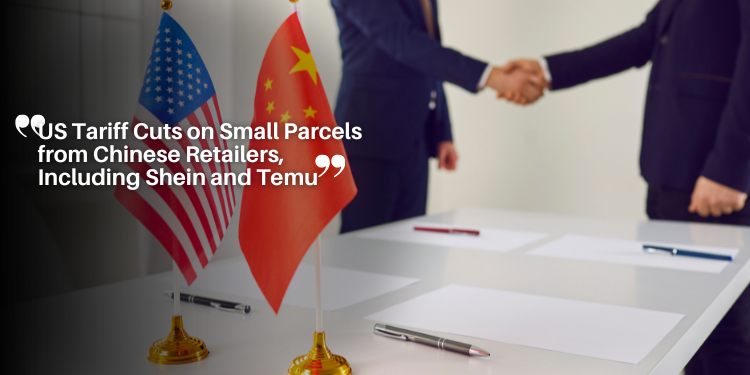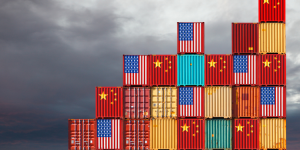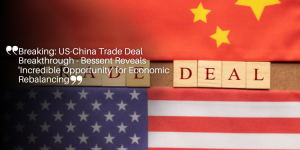US Tariff Cuts on Small Parcels from Chinese Retailers, Including Shein and Temu

President Trump Reduces Import Tariffs on Small Shipments from China and Hong Kong, Easing Trade Tensions
US Slashes Tariffs on Small Parcels from Chinese Firms like Shein and Temu
In a major development on the US-China trade front, President Donald Trump has announced a reduction in tariffs applied to small packages from Chinese firms, including e-commerce giants Shein and Temu.
This decision comes just hours after both the United States and China agreed to reduce levies on each other’s goods for a limited 90-day period.
The tariffs, which have historically impacted parcels valued up to $800, have been slashed from a hefty 120% to a more manageable 54%.
This announcement was made public through a White House statement that also confirmed the retention of a flat fee per parcel, which will remain at $100.
Furthermore, a previously scheduled charge of $200, which was set to take effect on June 1, has been canceled altogether.
For years, companies like Shein and Temu have benefited from a policy known as the “de minimis” exemption.
This exemption allowed small-value goods to be shipped directly to US consumers without incurring tariffs or import taxes, making it an attractive option for international e-commerce businesses.
However, this loophole was closed earlier this month by the Trump administration, leading many shoppers to make last-minute purchases to avoid higher costs.
Neither Shein nor Temu have responded to requests for comment from major news outlets, such as the BBC, following the tariff changes.
The timing of the tariff reductions coincides with a broader effort by both nations to resolve the ongoing trade tensions that have characterized their relationship in recent years.

A Shift in Trade Policy: A Temporary Relief for Businesses and Consumers
This decision to reduce tariffs on small parcels is part of a broader trade negotiation between the United States and China.
In a joint statement released by both governments, the two countries outlined their plans to temporarily cut tariffs as part of a commitment to resume trade discussions.
This move follows a weekend of high-level talks, which were framed by Trump as a “total reset” in the trade relations between the two economic superpowers.
As a result of the newly agreed terms, tariffs on certain Chinese goods imported into the US will decrease significantly.
For example, the tariffs applied to some Chinese imports will drop from 145% to 30%, a sharp reduction that has been welcomed by businesses and consumers alike.
Similarly, China has agreed to lower its retaliatory tariffs on US goods from an eye-watering 125% to a more modest 10%.
These developments have provided some much-needed relief for US businesses that have been struggling with the effects of the trade war, which has led to higher prices and disrupted supply chains.
Share markets responded positively to the news, with stocks rising sharply on Monday following Trump’s announcement of the tariff reductions.
Looking Ahead: Will These Tariff Cuts Last?
Despite the temporary nature of the tariff reductions, President Trump expressed cautious optimism about the prospects for future trade relations with China.
While some tariffs have been suspended rather than fully removed, Trump indicated that they could be reinstated in three months if there is no significant progress made in the ongoing negotiations.
“We’re not looking to hurt China,” Trump remarked after the agreement was made public. He also emphasized that China had been adversely affected by the trade war, noting that the country was “being hurt very badly.”
Trump’s comments reflect a broader intention to recalibrate the US-China trade relationship, focusing on achieving a fairer and more balanced trade arrangement.
The president further indicated that he expected to speak with Chinese President Xi Jinping later in the week to continue discussions.
The meeting, if it takes place as anticipated, could signal the beginning of a new chapter in US-China trade relations, one that is focused on cooperation rather than confrontation.
| Topic | Details |
|---|---|
| 🛍️ Impact on E-commerce | Changes in tariffs could affect business models of companies like Shein and Temu |
| ⚖️ Tariff Reduction | Tariff reductions offer relief but are temporary and uncertain |
| 📉 Short-Term Benefits | Consumers may see lower prices on clothing, electronics, and household goods from Chinese retailers |
| ⚠️ Uncertainty | Uncertainty about the duration of tariff reductions may lead to cautious behavior from consumers and businesses |
A Global Perspective: Trade Tensions and Global Markets
The US-China trade war has had a far-reaching impact on global markets, disrupting supply chains, raising costs, and prompting a rethinking of international trade practices.
The reduction in tariffs is a step toward de-escalating the trade war, but it remains unclear how sustainable this peace will be in the long run.
For many businesses that rely on Chinese imports, such as those in the technology, fashion, and retail sectors, the tariff changes are a welcome relief.
However, the broader uncertainty surrounding the future of US-China trade relations means that companies may need to adapt quickly to changing conditions.
In the coming months, the international community will be watching closely to see if the US and China can maintain the momentum of these trade talks and build a framework for more predictable and stable trade relations.
Conclusion: A Critical Moment for US-China Relations
As the US and China continue to navigate their trade relationship, the outcome of the current round of negotiations will have far-reaching consequences for global trade and the economy.
The temporary reduction in tariffs provides a short-term reprieve for businesses and consumers, but the long-term effects remain uncertain.
For now, it seems that both nations are committed to finding common ground and resolving the issues that have created tensions in recent years.
Whether these efforts will lead to a lasting trade agreement or whether the tariffs will return in full force in the future remains to be seen.
As the situation develops, it will be crucial for businesses, particularly those in the e-commerce sector, to stay informed and prepared for any further changes to trade policies.







